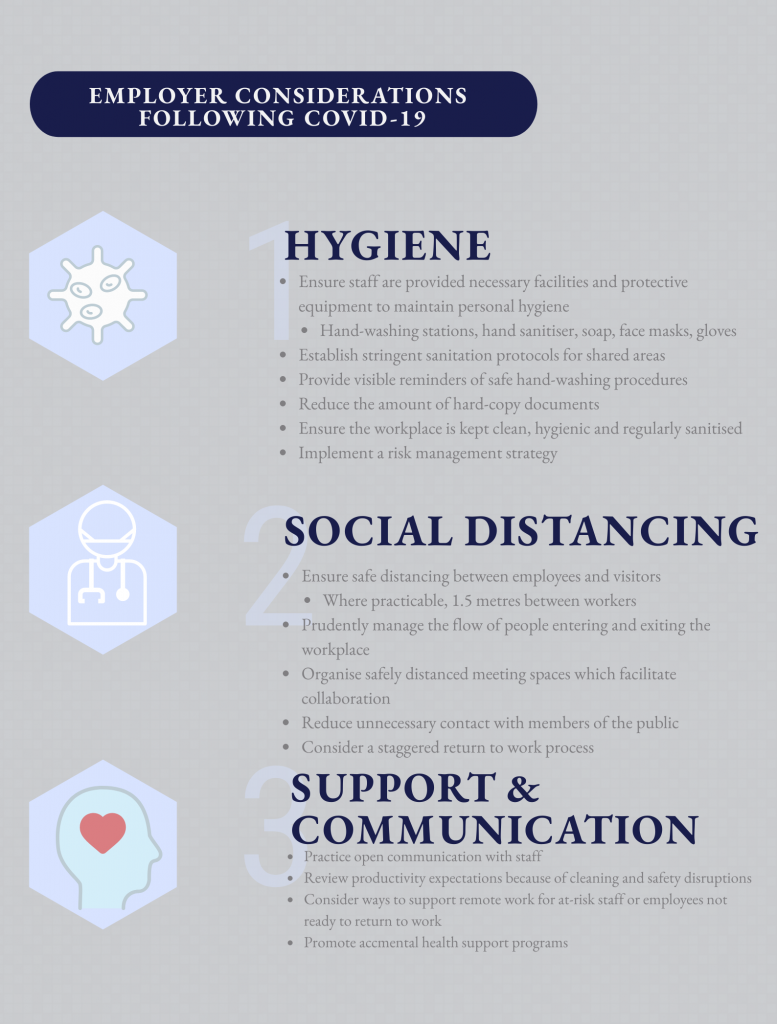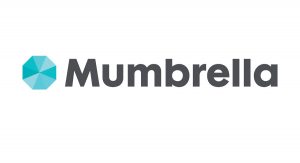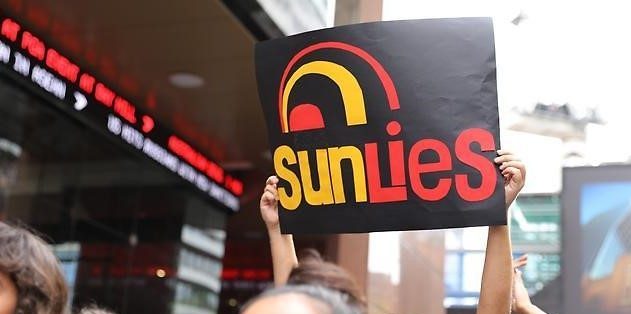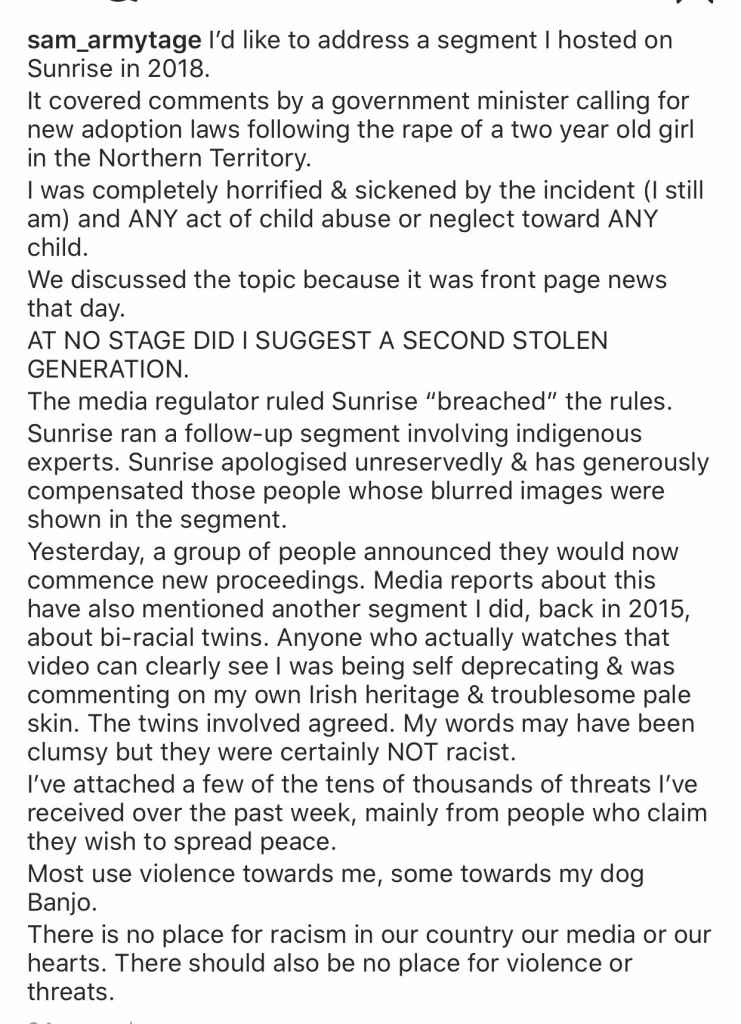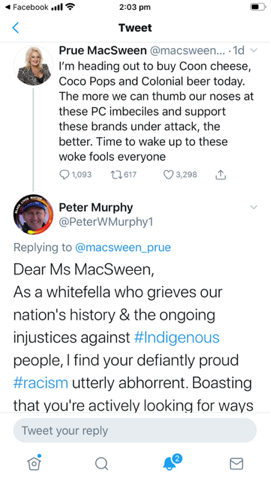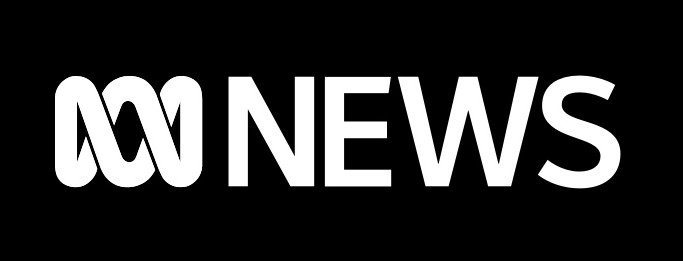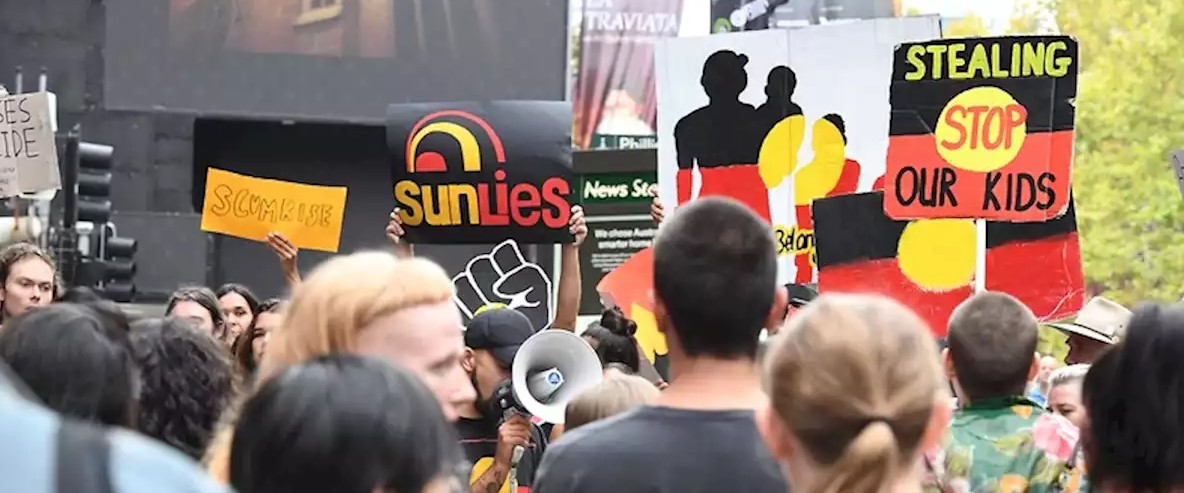Following, the groups media release on 11 June 2020 and subsequent media reports, Samantha Armytage and Prue McSween have made public comments on Twitter over the past week, responding to the pending Federal Court group complaint/class action. On 12 June 2020, Samantha Armytage tweeted the following:
In response, lead complainant and Aboriginal Elder, Auntie Debbie Swan stated this morning:
“Australian’s are so complacent in their racism, that by making poor excuses for why they don’t think something is racist, they show their ongoing ignorance. You always hear “I’m not racist but…” That is the trouble with people like Samantha, they don’t know racism when they see it because they’ve been doing it for so long and getting away with it. We know racism and racial vilification because we deal with it every single day of our lives. How Samantha manages to turn herself into the victim is a miracle right out of the racist’s playbook! We would be fighting every minute of every single day if we had to address every single act of racism, we face each day. The reason we decided to take a stand in this case is because it is just not acceptable for prominent, influential people like Samantha Armytage and Prue MacSween to get away with such inflammatory, uneducated comments in 21st century modern Australia on national television or anywhere else.”
On 17 June 2020, Prue MacSween tweeted:
![]()
In response to both Armytage’s and MacSween’s recent statements, Elder, Aunty Rhonda Dixon-Grovenor, stated this morning:
“What Sam Armytage is saying is simply not true. She expressly agreed with Prue’s call for a second Stolen Generation – it is clear in the segment transcript for all to see. And what about all the white, non-indigenous paedophiles – when did Sam ever get charged up about those very serious issues regarding white children being abused which happens every single day in every suburb in Australia – I haven’t seen her comment on that! As for Prue’s ongoing uneducated, ignorant and offensive comments – from the standpoint of a traditional Gadigal Elder and all the mob at the #Black Lives Matter/ Black Deaths in Custody rallies, I think it is entirely appropriate that the statues, brands and symbols that glorify Australia’s colonial history of genocide are challenged and reconsidered. As an Aboriginal Australian, these big glorified statues make me feel that I am just not valued, that I’m nothing, that I don’t matter; that the suffering of my people, my family and my community doesn’t matter. When they put all these statutes up reminding Aboriginal people that this nation is honouring people who have stolen your land, killed your families, stolen your culture, and stolen your children and reinforcing that everyone else is benefiting from living on your tribal land. We Gadigal people were one of the first colonised groups. We still feel the brutality of invasion and genocide reverberate from generation to generation via intergenerational trauma and the lack of respect, acknowledgement, and denial of our dignity by every Australian government or colonial authority for over 200 years. To see these prominent people like Sam and Prue continue saying these intentionally offensive things for all the world and media to hear, these racist things, well, good on them because they are exposing themselves and Australia’s black history is finally showing its face, its true colours. Until we can get rid of this virus of racism, we are not going to be able to move forward as the wonderful country that we can be. As the traditional Gadigal people of Sydney, we are leading the #Black Lives Matter/ Black Deaths in Custody rallies to all join together as nation on this continent and we are hoping that all our other non-Aboriginal brothers and sisters will join with us.”
Gwenda Stanley, a Gomeroi Woman from Moree, NSW, who is also party to the Group Complaint stated:
“We are living in historic times with this global movement against racism and yet, in 2018 or 2020 in Australia, Aboriginal people are the most aware of our collective history, that history of dispossession and genocide that has never left us, that we are still reminded of day in and day out in Australia by the denial of our history by the Australian nation, the denial of our birth rights for generations and generations and the glorification of colonisation via statues and other inappropriate symbols of conquest erected upon our sacred traditional lands. Let us not forget that the removal of children in Australia led to a culture of child slavery under the lie of “civilising” Aboriginal people. Just like the lie of “Terra Nullius”, it is time for all of these lies of racism to stop. When the Australian national anthem says, “In history’s page let every stage Advance Australia fair”, that means we need to reintegrate the forgotten pages of our history and seek justice and accountability. It reminds me of a powerful quote attributed to Pemulwuy in Eric Wilmot’s historic novel Pemulwuy – the Rainbow Warrior in his interaction with the colonisers:
“[Lieutenant Marshall] got to his feet. “You call the British savages,” he said loudly. “Yet we offer you protection, civilisation and Christianity! We try to show you how to use this land properly!”
“Civilisation!” Pemulwuy shot back fiercely. “You are people who build your world on the suffering and misery of other people. Your means of exchange is the rum.” He paused, his face dark with anger. “Your religion has no strength,” he snarled. “It does not punish evil people. You are a disease that arrived on our shores.” Pemulwuy pointed a long, sinewy arm at Marshall. “You came simply to steal our land!”
Simone Davison, a Ngarigo Woman from Bairnsdale Victoria, who is an actor who lives in Sydney and part of the Group Complaint stated:
“First Nations people have been dealing with this type of rhetoric from Australia’s for far too long. So, it’s no surprise that Samantha Armytage has lack of understanding and or responsibility for her words and actions. Just like the reports of her ancestor George Armytage. She too with little to no thought of the hurt and devastation caused to First Nations people two and half century’s on down the generations. By openly agreeing with Prue MacSween’s comment about suggesting another Stolen Generation. On national television! Was and still is hugely devastating. Even two years later after the comments were made, she’s still in denial with no remorse or understanding of enormity of what’s was said on national television is the reason why we will continue on with proceeding.”
Background to Sunrise RDA Group Complaint:
The Group Complaint focusses on a controversial ‘abhorrent’, ‘vile’ and ‘racist’ Hot Topics segment recommending another Stolen Generation as a way to solve child welfare issues which was broadcast nationally on Channel 7 Sunrise on the morning of 13 March 2018. The segment featured controversial commentator Prue McSween as well as radio host Ben Davis and Sunrise Host Samantha Armytage. During the segment, Armytage, MacSween and Davis discussed child removal in ‘Indigenous families’ and ‘white families’ and asserted factually inaccurate statements about Aboriginal child removal which were alleged to be deeply hurtful and harmful to Aboriginal Australians and their families. The panel failed to include any Indigenous speakers or anyone with any expertise in the important and sensitive issues being discussed. MacSween even went so far as to state that “just like the first Stolen Generation where a lot of children were taken because it was for their well-being, we need to do it again”.
The segment was subsequently found by the Australian Communications and Media Authority (‘ACMA’) in August 2018 to have breached the Commercial Television Industry Code of Practice for inaccuracies and for provoking serious contempt on the basis of race in breach of the Code as the segment contained strong negative generalisations about Indigenous people as a group. On 4 April 2019, Channel Seven withdrew an application to have the Federal Court review the ACMA’s finding and agreed to provide to the ACMA a court enforceable undertaking, in relation to sensitive and complex matters of this kind, to:
- commission an independent audit of the production processes for the current affairs content of Sunrise; and,
- ensure editorial staff are provided with training in relation to identify and deal with such matters.
The segment was also the subject of a defamation case brought by members of the Yirrkala Aboriginal Community who were featured in unrelated file footage during the segment and who also sued for breach of privacy, breach of confidence, race discrimination and breach of Australian consumer law. That case settled in December 2019 in a settlement approved by the Federal Court for an undisclosed amount of compensation, and Channel Seven was ordered to pay their legal costs. Channel Seven also agreed to give a public apology. With the global uprising of the Black Lives Matter movement following the murder of George Floyd, and the significant peaceful protests that took place throughout Australia last weekend calling for justice for 400+ Aboriginal Deaths in Custody since the 1991 Royal Commission, the complainants said that it is gratifying to see some progress at last in race relations in Australia.
The Group Complaint is being led by both Aboriginal Elders and young Aboriginal leaders from around Australia including those from the groups Grandmothers Against Removal NSW and FISTT (Fighting in Solidarity Towards Treaties) responsible for organising the rolling protests outside Channel 7 HQ in Martin Place in the days immediately following the broadcast which were sensationally censored by Channel 7 and during the Sunrise broadcast from the Gold Coast during the Commonwealth Games.
The group is represented by leading anti-discrimination and human rights Queensland law firm, Susan Moriarty & Associates. The Complainant Group is comprised of the following members:
- Aunty Rhonda Dixon-Grovenor (Gadigal & Yuin Woman, Sydney, and South Coast NSW).
- Aunty Debra Swan (Yinaar (Woman) from the Goonoo Goonoo tribe of the Gomeroi Nation from Moree/Terry Hie Hie area and Wailwan tribe of the Wiradjuri Nation NSW, lives in Newcastle).
- Cameron Manning (Gomeroi Man, Mungindi, Toomelah and Boomi, lives in Newcastle).
- Lynda-June Coe (Wiradjuri Woman of the Lachlan River, Erambie, NSW lives in Newcastle).
- Gwenda Stanley (Gomeroi Woman from Moree, NSW, lives in Brisbane).
- Ruby Wharton (Gamilaraay Kooma Yinnar (Woman) Cunnamulla, QLD, lives on the Gold Coast).
- Simone Davison (Ngarigo Woman from Bairnsdale Victoria, lives in Sydney).
- Trisha Morton-Thomas (Anmatter Women, Tanami Desert NT, lives in Alice Springs).
SCHEDULE
Extracts of AHRC RDA Complaints
In the Group Racial Discrimination Complaint filed in the Australian Human Rights Commission (AHRC) in September 2018, Aunty Rhonda Dixon-Grovenor, stated: “I am a traditional descendent of the Gadigal and Yuin people of Sydney and the South Coast Of NSW. I found the Sunrise panel’s comments to be very racist and hurtful as my grandfather and his two brothers were stolen from their parents and put into the Kinchella Boys Home where they were treated very cruelly. This broadcast has bought great sorrow hurt for our people and contributed to the intergenerational trauma which today affects my family mentally, physically and spiritually”.
Elder, Aunty Debra Swan, who represents the group Grandmothers Against Removal NSW she co-founded nearly five years ago stated: “I am a co-founder of Grandmothers Against Removal NSW and have been working voluntary with this group for six years, to stop removal of Aboriginal children from their families and to restore children, (in the Out of Home Care system) back to their families. When I first watched the Sunrise program, I was outraged and thought: ‘How can these three people, Ms Armytage, Ms MacSween and Mr Davis talk about this issue without any experience or qualification?’ They obviously did not know what they were talking about and were quite racist in their comments. My outrage quickly turned to insult given the knowledge I have in relation to this very topic. I was offended as well, not just for myself but for the Stolen Generation, the continuation of the stolen generation, the children who are in care at present and all families who have been subjected to this system of Child Protection, and Aboriginal people generally as we have all been affected.”
Award-winning writer, producer and actress Trisha Morton-Thomas, Anmaterr woman from the Tanami Desert who lives in Alice Springs (known for the films: Occupation Native (2017), 8MMM Aboriginal Radio (2015), The Song Keepers (2017) and Radiance (1998)) has joined the Group Complaint and stated: “I have joined this complaint because across this continent, Aboriginal cultures practice responsibility and obligations to our much-loved children and our families, this is the core of our cultures. Our children have to be safe and protected as that is our lore. We come together across our nations here as the First Peoples of this continent celebrating 65,000 – 80,000 years of the oldest continuous culture on our planet. We ask to be treated with dignity and humanity as together we try to heal the hurts of the past 248 years.”
Gwenda Stanley Gomeroi Woman from Moree, NSW, who lives in Brisbane stated: “…I am writing to express my utter disgust at the Sunrise segment on the 13 March 2018 in relation to the divisive and deeply insulting comments made by presenter Samantha Armytage, Prue MacSween and Brisbane Radio host Ben Davis about forced adoption of Aboriginal kids and the need for a new Stolen Generation. I am deeply offended and hurt by comments made in that segment and interviews after this incident, defamation insults towards us as activist, calling us dole bludgers lazy and have nothing better to do and to say that we don’t care is extremely insensitive. As an advocate for my people I am drained emotionally and spiritually by these direct assaults in us Aboriginal Activists who are highly respected in our communities and in our work environments. The views of us Aboriginal people expressed by Armytage, MacSween and Davis are typical colonial traits of ideologies that seem to be family orientated and hereditary of their strong negative generalisation of us Aboriginal people of Australia.”
Simone Davison a Ngarigo Woman from Bairnsdale Victoria, who is an actor who lives in Sydney stated: “On the morning of the 13 March 2018, I watched the Sunrise panel consisting of Samantha Armytage, Prue MacSween, Ben Davis speak in support of the forced adoption of Aboriginal children and a new Stolen Generation. This panel did not include an aboriginal representative. My immediate thought was dismayed that a national news reporter and commentators could make such misleading statements on television without true facts. It has been far too long that we have had to endure derogatory comments by non-indigenous peoples. This only carries on the written statement made by an earlier English Explorer who referred to us indigenous as wretched blacks. As mother and a black woman, I’m completely offended and appalled and distressed about the inflammatory comments made by the Sunrise panel and what this bring to our children and our children’s children.”
Young Aboriginal Leader and representative of FISTT, Cameron Manning, a Gomeroi man from Mungindi, Toomelah and Boomi stated: “The shameful history of the forced removal of Aboriginal and Torres Strait Islander children across this continent is an issue that must be known and understood by everyone. This is a history of colonial violence, intergenerational trauma and genocide that have created a deep hurt for us as Aboriginal people and families that continues to this day. The statements made by the non-Indigenous Sunrise panellists and the emotive sensationalist language used by the presenter had no basis in reality, and perpetuated racist stereotypes without any historical or political context given to the issues being presented. I was affected deeply by this event, which is why I joined hundreds of people in protest at the ‘sunrise’ studios at Martin Place to stand up against this abhorrent behaviour and negative portrayal of my people in the racist Australian media.”
Lynda-June Coe, a Wiradjuri Woman of the Lachlan River, from Erambie Cowra NSW, a high school teacher and PhD candidate at the University of Newcastle stated: On the morning of the panel I became aware of the comments made by the all-white panel from friends who notified me through social media. Immediately I watched the episode and my response was in complete and utter shock at the total disregard and lack of informed dialogue allowed to go to air surrounding such highly sensitive and historically damaging issues pertaining to the lives of my people and community. Following this, I immediately set about organising a call to action and protest at Martin Place, Channel 7 studios to send a direct message that this hate speech is not on! We can no longer condone or allow the media to perpetuate divisive material and to race bait Aboriginal people any longer. Enough is enough!”
Ruby Wharton, university law and justice student and Young Aboriginal Leader from the Gold Coast stated: “I am fortunate enough to have had only one grandparent who was a part of the Stolen Generation, however, what my grandmother endured is something that I could never be appreciative of. She was born at Cherbourg and had been raised as a domestic slave in dormitories in Cherbourg, Palm Island and Woorabinda. My grandmother was forced to leave the missions to do domestic work on properties for white families, she was placed with one family who had beaten her so badly that she could no longer smell or hear, unfortunately she was also whipped and raped at this same property. My grandmother is the reason why I am heavily involved with Aboriginal affairs and politics. My grandmother’s experiences were the furthest from being beneficial for herself and if anything had given her reason to fight all forms of racial discrimination even more so. I viewed the Sunrise broadcast on the 13 March 2018 while I was traveling to university via public transport and the segment had been shared in my Facebook newsfeed a number of times. I was shocked that such ill-informed opinions can be posed as truth in prime-time morning television, it was incredibly insulting to myself, my family and my community to observe this vile propaganda. This topic of discussion should not ever be taken lightly, this is a dialog that has the power to dictate the lives and well-being of individuals, this is a discussion that needs to be well informed and involve the appropriate people.”
Media Contact: To arrange an interview please contact Susan Moriarty & Associates:
P: 07 3352 6782 E: admin@susanmoriarty.com.au
